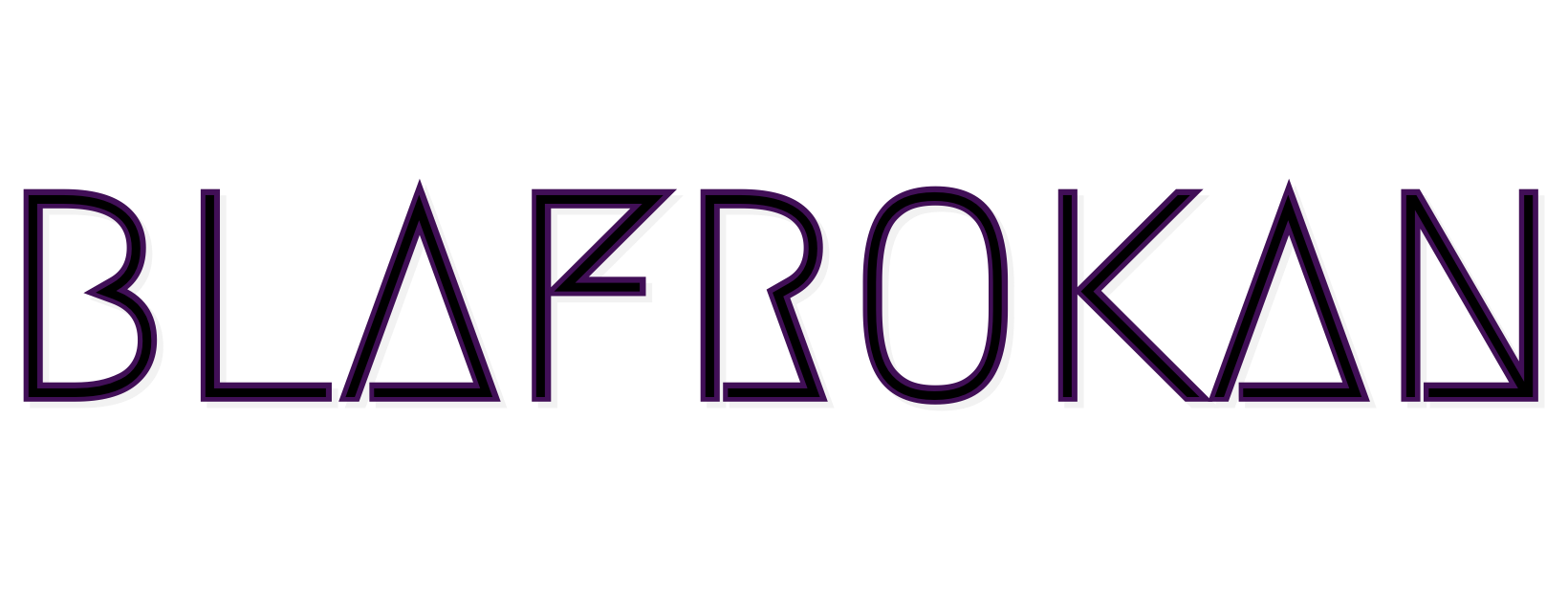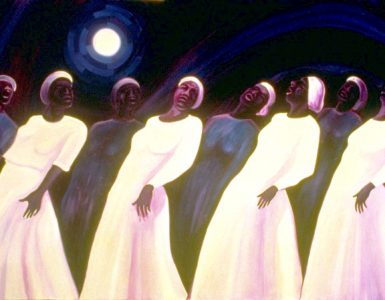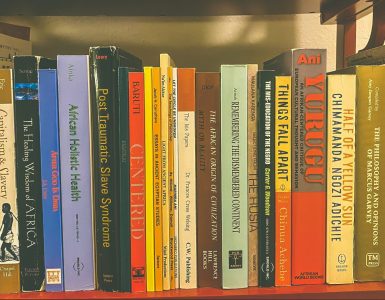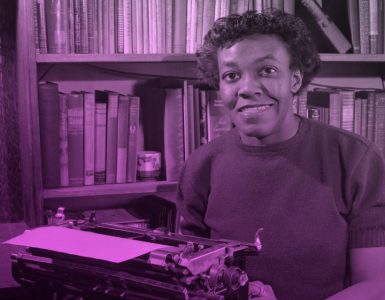What if you could double your income within a year? It appears the collective consciousness of Black/African Americans is shifting towards “getting the bag,” via business ownership and economic empowerment, but how do we wisely accelerate our vehicle to financial security? Can we supply our individual needs without dismissing the economic conditions of our Black communities? Is the lack of financial literacy and political awareness limiting cash flow circulation and stifling opportunities to develop wealth?
A comfortable lifestyle may distract one from building a legacy and one is live hand to mouth building wealth may not even be a thought. Shortly after the turn of the 20th century our Ancestor’s tradition of building wealth, estate planning, and producing generational inheritance through small businesses and land ownership became evident as countless Black Wall Streets sprung up around the United States. Deeply woven into the fabric of African families was a self-sufficiency spirit that permeated nations of people to erect prominent empires like Great Zimbabwe, Mali, Aksum and Benin. A multitude of these empires flourished for hundreds, and some thousands of years. In essence, prior to the Maafa, “poverty” and “Africans” were far from association. We may not have “rich” individually by the standards of today but we had what we needed. Wealth and prosperity engulfed the minds of foreigners upon mentioning “African” for eons. The African will soon again invoke images of power and prestige once we decide to return to our way of life.
Fast forward to rap mogul, entrepreneur, and TV/Film Producer Perry Miller, best known as “Master P” whose net worth is $250 million. His musical empire No Limit Records was seeded from a $10,000 inheritance left by his grandfather. What if he had blown $10,000 on new J’s, jewelry, clothes, fine dining and a leased luxury vehicle to feel like a king for a few short-lived months? Instead he started a record label. In retrospect of his investment and business success, we grasp the value of leaving a legacy and instilling a wealth building mindset.
“If you don’t know better, you can’t do better.” – John Hope Bryant
Let’s return to knowing, sharing what we know and doing better to improve our quality of life. Instead of belaboring you with discouraging stats and reports on Black economic disparities and shortcomings, we can examine the financial landscape by asking ourselves a few basic questions:
- What do I or we as a people own?
- What do we manufacture and distribute?
- What major industries do we control and operate exclusively?
- Can we adequately supply our own essential needs if we patronized Black/African businesses exclusively?
How does that make you feel? Envision the sense of pride our Ancestors once felt when they owned and controlled their destiny. We can reclaim our throne, reestablish ownership of our future and secure our sovereignty. It begins with individual households re-learning their fluency in wealth building principles.
Check out this short but powerful list to set your foundation for wealth building:
 1. The Mis-Education of the Negro
1. The Mis-Education of the Negro
By Carter G. Woodson
African World Press $9.95
The mis-educated Negro of the modern era must re-examine their thinking in all areas of life, including how it impacts our bottom line. The Mis-Education of the Negro is a book that could be read, studied, then reread. For a book published 85 years ago it reads as though it were published yesterday. It is foundational to the understanding of our present impoverished and struggling mentality and reality and what must be done to correct it.
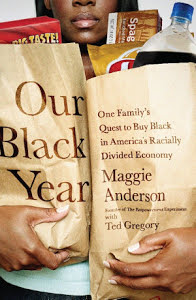 2. Our Black Year: One Family’s Quest to Buy Black in America’s Racially Divided Economy
2. Our Black Year: One Family’s Quest to Buy Black in America’s Racially Divided Economy
By Maggie Anderson
Public Affairs $14.99
What if the solution to Black economic despair was as simple as changing our minds? Practically overnight we could dramatically shift the decimal point on our bank accounts to the right, if we followed Maggie Anderson’s example. She knows the value of our Black dollar, which is why she decided to create “The Empowerment Experiment,” wherein her household exclusively bought Black for one year. Some considered her quest “racist” and “militant.” Imagine that, Black people owning and controlling their economies is offensive to some folks. After reading this book, spending Black first will seem less trivial and more of an obligation, also raising one’s sense of self pride.
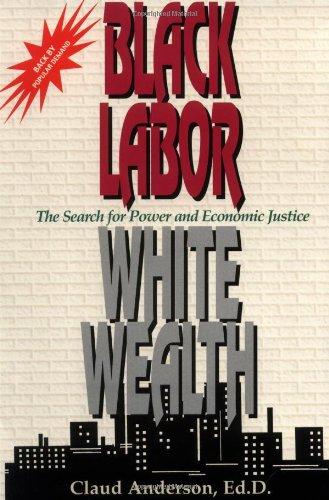 3. Black Labor White Wealth: The Search for Power and Economic Justice
3. Black Labor White Wealth: The Search for Power and Economic Justice
By Dr. Claud Anderson
PowerNomics Corporation of America $15.95
Dr. Claud Anderson diagnosed what is the economic problem for Black people in America, offering a historical analysis of how racism “locked and boxed” Black people into a near permanent underclass. He offers analysis on the true definition of the terms “power” and “progress.” He pulls no punches when addressing impediments to economic empowerment and justice; the Europeans reasoning for enslaving Africans and the immigrants who are complicit in our exploitation. This book covers how we Africans in America can become politically and economically competitive and build foundations for economic power.
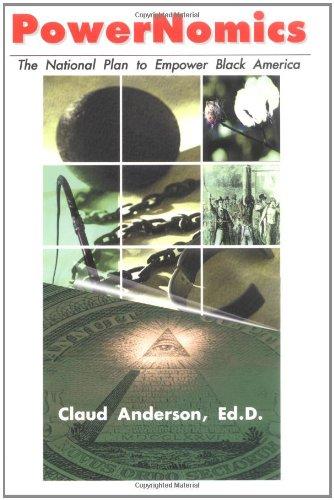 4. Powernomimcs: The Nation al Plan to Empower Black America
4. Powernomimcs: The Nation al Plan to Empower Black America
By Dr. Claud Anderson
PowerNomics Corporation of America $28.00
In PowerNomics, Dr. Anderson cleans our financial and political lens, offering insightful analysis and a strategic 5-year plan to return Black people to our rightful place, dignity and self-sufficiency. He describes how we can use Education, Economics, Politics and Religion to benefit our race and focuses greatly on Black people constructing industries within our communities where we have the competitive advantage.
Dr. Anderson’s 5 year plan answers what may be controversial to some, but pressing questions pertaining race, class, culture, power and politics:
Why are Blacks the only group that equates success with working in a White corporation, government or the entertainment industry?
How did power and wealth – businesses, resources, privileges, income and control of all levels of government get so disproportionately distributed into the hands of White society?
Industrialization brings many economic benefits to the geographic locations where it occurs. Why has Black America never been industrialized and how can it be done? – Why do visible Blacks and Black leaders avoid blackness, identifying the focus of their work instead for people of color, minorities, women, gays, the poor, Hispanics, and other immigrant groups?
What enables a constant stream of immigrant groups to politically, economically and socially dominate Blacks? – In politics, how is it that Blacks can be monolithic and loyal political supporters yet their group receives no quid pro quo benefits? – Dr. Claud Anderson
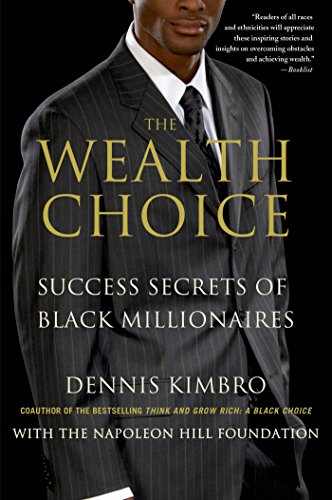 5. The Wealth Choice: Success Secrets of Black Millionaires
5. The Wealth Choice: Success Secrets of Black Millionaires
By Dennis Kimbro
Palsgrave Macmillan $25.00
What do you know about Janice Bryant Howroyd, Reginald F. Lewis, Maggie Lena Walker, Richard Parsons and Barbara “B. Smith”? What do you know about Richard “Dick Griffey,” Nathaniel R. Goldston III, Lisa Nicole Cloud, Don Barden, James and Robert Paschal? Their names may be unfamiliar, yet many could write a short bio on Oprah Winfrey, Jay Z, Serena Williams and LeBron James. While those individuals aren’t without merit or mention, there are countless Black business titans who have triumphed overwhelming odds, including race and gender politics and snatched success. These models are often overlooked because their influence lies in industries beyond entertainment and sports. In The Wealth Choice, Dennis Kimbro teaches how to develop a wealth mentality, employ winning habits, commit to lifelong education, center financial goals around one’s passions, and execute a plan of short term sacrifice for long term rewards. In addition, Kimbro shares endless pearls of wisdom from exclusive interviews and private conversations had with Cathy Hughes, Tyler Perry, Steve Harvey, Lisa Price of Carol’s Daughter, and others.
